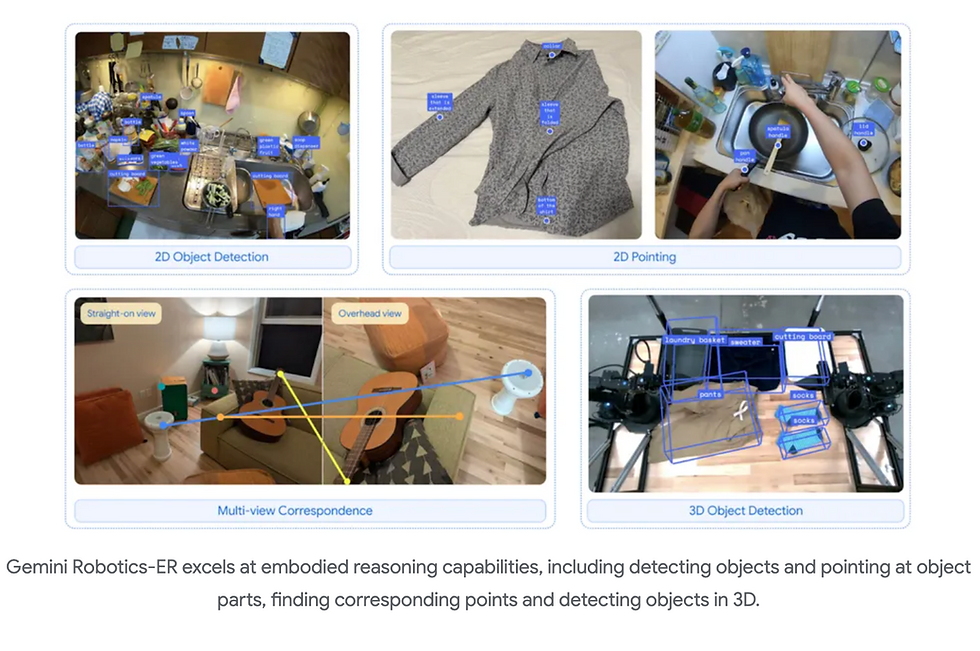Another Crazy Day in AI: How Robots Are Learning New Tricks
- Wowza Team

- Apr 1, 2025
- 4 min read
Updated: Apr 2, 2025

Hello, AI Enthusiasts.
Lights are off, but AI is still running the show.
As Google DeepMind geared up to announce its new family of Gemini 2.0 models for robots, head of robotics Carolina Parada gathered her team for a final check of the technology’s capabilities.
Meanwhile, OpenAI kicks off a new era for the OpenAI Academy with a hub dedicated to enhancing AI literacy. Look out for free tools and insights that make AI friendly for all—no expert status required!
And if you think AI is just a trend, think again! In his new book, Business at the Speed of AI, OpenText CEO Mark J. Barrenechea reveals how AI will transform industries, redefine work, and drive groundbreaking discoveries.
That’s it for tonight—keep an eye on AI.
Here's another crazy day in AI:
Google's next step in AI-powered robots
OpenAI expands AI literacy with new learning hub
Mark Barrenechea’s vision in "Business at the Speed of AI"
Some AI tools to try out
TODAY'S FEATURED ITEM: Robots That Learn Like Humans

Image Credit: Wowza (created with Ideogram)
What if robots could learn new skills as intuitively as humans do?
Google DeepMind’s latest advancements in robotics introduce a new family of Gemini Robotics models, designed to help robots learn and adapt to a variety of real-world tasks. In an article on The Keyword, Joel Meares shares how these models are pushing the boundaries of what robots can learn and do. Built on Gemini 2.0, these models help robots process language, recognize objects, and perform complex physical tasks—all without needing to be retrained for each new challenge.
How the new generation of Gemini Robotics models was built:
Multimodal learning: The models are trained on diverse data types, including text, images, and actions, enabling robots to better understand their environment and engage with it in a more human-like manner.
Real-time adaptability: By incorporating feedback during training, these models allow robots to adjust their actions based on new information and unexpected situations, enhancing their problem-solving capabilities.
Task generalization: Instead of focusing solely on specific tasks, the models are designed to learn from a wide variety of activities, helping robots develop skills that can transfer across different scenarios.
Interactive training: Google’s team tested the models by having robots perform practical exercises, such as household chores and games, which helped refine their learning and adaptability.
Flexible architecture: The models can be implemented across various robotic platforms, from simple arms to more complex humanoid forms, making them suitable for numerous applications.
Collaborative testing: Working alongside researchers and engineers, the models were evaluated in different environments to ensure their reliability and versatility in real-world applications.
Continuous improvement: The development process includes ongoing iterations based on real-world performance, ensuring that the models evolve to meet new challenges and enhance their effectiveness.
Traditionally, robots have been designed to perform specific tasks with great accuracy, often repeating the same actions over and over. While this approach works well in controlled environments, it can struggle in real-world situations where things can change unexpectedly. The new Gemini Robotics models mark a departure from this one-dimensional thinking. They’re built to adapt, allowing robots to learn from their experiences and respond to new challenges as they arise.
This ability to think on their feet opens up exciting possibilities for how robots can be used in various industries, including healthcare, logistics, and even our homes. Although we’re not quite at the point where robots can seamlessly integrate into our daily lives, innovations like these are getting us closer to that goal. Instead of just handling repetitive tasks, these advanced models are paving the way for machines that can truly understand, learn, and tackle complex problems in more meaningful ways.
Read the full article here.
OTHER INTERESTING AI HIGHLIGHTS:
OpenAI Expands AI Literacy with New Learning Hub
/OpenAI
OpenAI has launched a free online resource hub to expand AI literacy and accessibility for learners of all backgrounds. The OpenAI Academy will offer educational materials, workshops, and discussions, catering to educators, students, job seekers, and nonprofits. Partnering with institutions like Georgia Tech and Goodwill, the Academy aims to empower individuals with AI skills for personal and professional growth. Future plans include multilingual content, community groups, and global collaborations.
Read more here.
Mark Barrenechea’s Vision in "Business at the Speed of AI"
/Mark J. Barrenechea, CEO & CTO, on OpenText
AI is set to transform every industry over the next decade, from business and healthcare to climate science and education. In his new book, Business at the Speed of AI, OpenText CEO Mark J. Barrenechea explores how AI-driven digital labor will redefine work, increase human potential, and unlock groundbreaking discoveries. With AI advancing knowledge work, cybersecurity, and automation, Barrenechea envisions a future where human and AI collaboration reshapes civilization.
Read more here.
SOME AI TOOLS TO TRY OUT:
JuliusAI – Chat with your data files for expert insights and stunning visualizations.
ChatBox – Your AI copilot for writing, summarizing, math, and more.
Purposewrite – Instantly generate and refine content for blogs, emails, and social posts.
That’s a wrap on today’s Almost Daily craziness.
Catch us almost every day—almost! 😉
EXCITING NEWS:
The Another Crazy Day in AI newsletter is on LinkedIn!!!

Leveraging AI for Enhanced Content: As part of our commitment to exploring new technologies, we used AI to help curate and refine our newsletters. This enriches our content and keeps us at the forefront of digital innovation, ensuring you stay informed with the latest trends and developments.






Comments